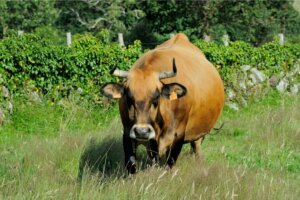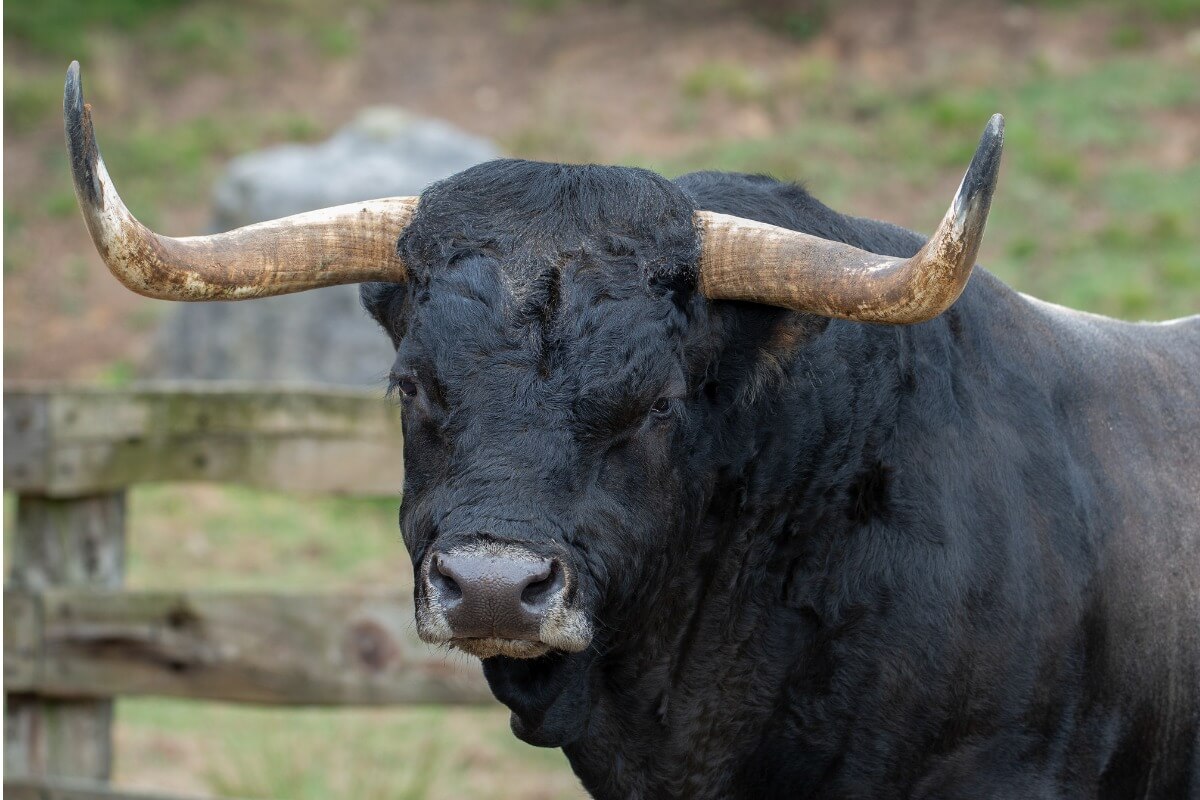What Do Bulls Eat?


Reviewed and approved by the biologist Samuel Sanchez
Known worldwide for bullfighting, bovine exhibitions, and agricultural practices, bulls are one of the most indispensable animals for livestock and farm life. Like all animals, their well-being requires a correct diet, and so asking about what bulls eat is the first step if you want to keep them in captivity.
However, the answer to this question is more complex than it first seems, and involves aspects such as the nutrients and specific amounts of food that bulls should consume. Here are the main elements that make up the diet of these large bovines.
What do bulls eat?
Bulls eat a rather limited range of foods. The basis of their diet in the natural environment and in captivity is grass, and it’s a herbivorous animal. These large bovines also include in their menu food based on fiber and legumes and concentrates consisting of wheat, sorghum, barley, rice, and other ingredients.
With these foods, the aim is to ensure that the bull’s nutritional development is the most appropriate. Therefore, these should be low in fat and created with natural raw materials that facilitate digestion. Also, in times of drought, good nutrition must be ensured through hay or dry grass (which has been carefully preserved in order to avoid the proliferation of bacteria).
There are some substances that bulls eat, but cannot digest (such as lignins and tannins). In contrast, the most commonly consumed plants are from the grass family found in pasture, such as white clover, red clover and alfalfa, which are a good source of nitrogen.
Cattlemen sometimes give feed supplements to bulls to fatten them up and increase their growth rate. They may also be offered protein or energy concentrates that include vitamins and minerals.

Nutritional requirements
During the winter and fall, bulls should be fed the necessary amount of feed so that their body condition doesn’t decline during these periods of pasture shortage. Also, overfeeding can cause bulls to become overweight, which decreases semen quality and mating ability.
Bulls, like some other cattle, don’t require supplements of water-soluble vitamins such as B1, B3, B12 and C because the bacteria in their digestive tract are able to synthesize them.
Therefore, it’s advisable to offer the optimal amounts of feed to avoid affecting the health of the cattle. The nutritional requirements of this mammal vary according to body weight, but in general a good percentage of calcium, potassium, phosphorus and digestible protein is indispensable.
In the case of proteins, the major source of these is found in the solid residues obtained from the extraction of oil from seeds or oleaginous fruits. The most famous are sunflower, soya or linseed oil. This nutritional alternative has evolved from the animal-based flours that were used as a protein concentrate in the 20th century.
Do bulls attack humans?
Although it’s true that on multiple occasions bulls have attacked humans, they have not done so with the intention of feeding on them. Since these bovids are herbivores, the attacks have mostly been due to activities such as bullfights and other traditions in which the animal is incited to chase the human.
Bulls’ digestive system
As mentioned above, bulls spend a lot of time feeding; an adult bull spends about 8 to 9 hours a day feeding (as do cows). The process starts with grasping the feed with their tongue and lower incisors. While chewing, saliva is produced, which helps the food go down to the stomach.
However, bulls (like other ruminant animals) regurgitate what they eat in order to chew it again and break it down. One of the great peculiarities of the bull’s stomach is that it is divided into 4 parts: 3 are dedicated to rumination and 1 to the main reservoir. These divisions allow the bull to take advantage of plant carbohydrates (such as cellulose).
The small intestine of bulls is responsible for the digestion and absorption of nutrients. The large intestine ferments the unabsorbed food and the colon absorbs the remaining water and minerals. Finally, the rectum receives the final waste and accumulates the feces to be expelled.

As you could appreciate, bulls eat limited food, but it’s full of nutrients and vitamins. This ensures their well-being, growth, and energy for the activities in the cattle ranch or participation in shows.
Known worldwide for bullfighting, bovine exhibitions, and agricultural practices, bulls are one of the most indispensable animals for livestock and farm life. Like all animals, their well-being requires a correct diet, and so asking about what bulls eat is the first step if you want to keep them in captivity.
However, the answer to this question is more complex than it first seems, and involves aspects such as the nutrients and specific amounts of food that bulls should consume. Here are the main elements that make up the diet of these large bovines.
What do bulls eat?
Bulls eat a rather limited range of foods. The basis of their diet in the natural environment and in captivity is grass, and it’s a herbivorous animal. These large bovines also include in their menu food based on fiber and legumes and concentrates consisting of wheat, sorghum, barley, rice, and other ingredients.
With these foods, the aim is to ensure that the bull’s nutritional development is the most appropriate. Therefore, these should be low in fat and created with natural raw materials that facilitate digestion. Also, in times of drought, good nutrition must be ensured through hay or dry grass (which has been carefully preserved in order to avoid the proliferation of bacteria).
There are some substances that bulls eat, but cannot digest (such as lignins and tannins). In contrast, the most commonly consumed plants are from the grass family found in pasture, such as white clover, red clover and alfalfa, which are a good source of nitrogen.
Cattlemen sometimes give feed supplements to bulls to fatten them up and increase their growth rate. They may also be offered protein or energy concentrates that include vitamins and minerals.

Nutritional requirements
During the winter and fall, bulls should be fed the necessary amount of feed so that their body condition doesn’t decline during these periods of pasture shortage. Also, overfeeding can cause bulls to become overweight, which decreases semen quality and mating ability.
Bulls, like some other cattle, don’t require supplements of water-soluble vitamins such as B1, B3, B12 and C because the bacteria in their digestive tract are able to synthesize them.
Therefore, it’s advisable to offer the optimal amounts of feed to avoid affecting the health of the cattle. The nutritional requirements of this mammal vary according to body weight, but in general a good percentage of calcium, potassium, phosphorus and digestible protein is indispensable.
In the case of proteins, the major source of these is found in the solid residues obtained from the extraction of oil from seeds or oleaginous fruits. The most famous are sunflower, soya or linseed oil. This nutritional alternative has evolved from the animal-based flours that were used as a protein concentrate in the 20th century.
Do bulls attack humans?
Although it’s true that on multiple occasions bulls have attacked humans, they have not done so with the intention of feeding on them. Since these bovids are herbivores, the attacks have mostly been due to activities such as bullfights and other traditions in which the animal is incited to chase the human.
Bulls’ digestive system
As mentioned above, bulls spend a lot of time feeding; an adult bull spends about 8 to 9 hours a day feeding (as do cows). The process starts with grasping the feed with their tongue and lower incisors. While chewing, saliva is produced, which helps the food go down to the stomach.
However, bulls (like other ruminant animals) regurgitate what they eat in order to chew it again and break it down. One of the great peculiarities of the bull’s stomach is that it is divided into 4 parts: 3 are dedicated to rumination and 1 to the main reservoir. These divisions allow the bull to take advantage of plant carbohydrates (such as cellulose).
The small intestine of bulls is responsible for the digestion and absorption of nutrients. The large intestine ferments the unabsorbed food and the colon absorbs the remaining water and minerals. Finally, the rectum receives the final waste and accumulates the feces to be expelled.

As you could appreciate, bulls eat limited food, but it’s full of nutrients and vitamins. This ensures their well-being, growth, and energy for the activities in the cattle ranch or participation in shows.
All cited sources were thoroughly reviewed by our team to ensure their quality, reliability, currency, and validity. The bibliography of this article was considered reliable and of academic or scientific accuracy.
- Bartolomé Rodríguez, D. J., Alonso De La Varga, M. E., García García, J. J., Posado Ferreras, R., Gómez, L., & Gaudioso Lacasa, V. R. Efecto del sistema de alimentación aplicado en el toro de lidia sobre diversos parámetros indicadores de alteración ruminal.
This text is provided for informational purposes only and does not replace consultation with a professional. If in doubt, consult your specialist.








